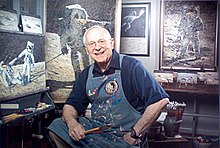Alan Bean (original) (raw)
The movement of human beings off the planet out into the Universe; first the Moon, and then Mars, and then who knows where, is just beginning and there is nothing that can stop it.
Capt. Alan LaVern Bean (15 March 1932 – 26 May 2018) was an American former naval officer and Naval Aviator, aeronautical engineer, test pilot, and NASA astronaut, and the fourth person to walk on the Moon. After retiring from the United States Navy in 1975 and NASA in 1981, he pursued his interest in painting, depicting various space-related scenes and documenting his own experiences in space as well as that of his fellow Apollo program astronauts. He was the last living crew member of Apollo 12.
Everyone is trying to reach for their own stars, and all of those stars aren’t light-years away. They are as close as our job, our family, our children, our next-door neighbors and our good friends.
Long after I’m gone, people will have these paintings with dust and footprints in them. It will be something really special for people to enjoy and remember.
An Interview with Alan Bean (1992)
[edit]
Quotes of Bean from "An Interview with Alan Bean" by Jim Plaxco, at Astrodigital (3 October 1992)
- History has spurts and then is steady, and then maybe even backing up a step, and then forward again.
- The movement of human beings off the planet out into the Universe; first the Moon, and then Mars, and then who knows where, is just beginning and there is nothing that can stop it. None of us know the timetable, none of us know whether it's going to happen rapidly or it's going to happen very slowly.
Eventually, as the centuries unfold, human beings will populate all these places and maybe a thousand years from now, or maybe it's two thousand or five thousand, there will be more human beings living off the Earth than live on it. Its just going to happen and we don't need to be anxious about it. We don't need to worry that next year they decide to cut the space station. If they cut the space station next year, I hope they don't, but if they did, it's not the end of the world. We're going to eventually have a wonderful space station. Eventually there are going to be cities in space. If Chicago had been founded a hundred years later, we wouldn't even know that now. I don't know when it was founded, but if it had been a hundred years later or a hundred years earlier, right now it wouldn't make any difference. It would probably look about the same. People would be just as happy doing the same things. That's the same way with space exploration. Maybe we don't go to Mars in my lifetime, maybe we don't even go till my grandkids lifetime. That's okay. Eventually it will happen.
After the moon, art is his mission (1997)
[edit]
Quotes of Bean from "After the moon, art is his mission" by George Schellenger, NBC News (5 December 1997)
- I think Genesis in the Old Testament has it wrong. I don’t think we were thrown out of the Garden of Eden. Just look around. We’re still in it, particularly when you compare the earth with the moon. The moon has no plants, no life, no water, no animals, no nothing.
- Long after I’m gone, people will have these paintings with dust and footprints in them. It will be something really special for people to enjoy and remember.
- Everyone is trying to reach for their own stars, and all of those stars aren’t light-years away. They are as close as our job, our family, our children, our next-door neighbors and our good friends.
- Statement on significations in his painting "Reaching for the Stars", at the U.S. Astronaut Hall of Fame, Florida, USA.
- Apollo is the greatest adventure of all humankind, and it needs to be recorded in every way possible for future generations in books, in movies and on television. … I’m an artist. That’s the way I care about things. Maybe 200 years from now, someone will say, "I’m glad he did that."
Wikipedia
Commons




